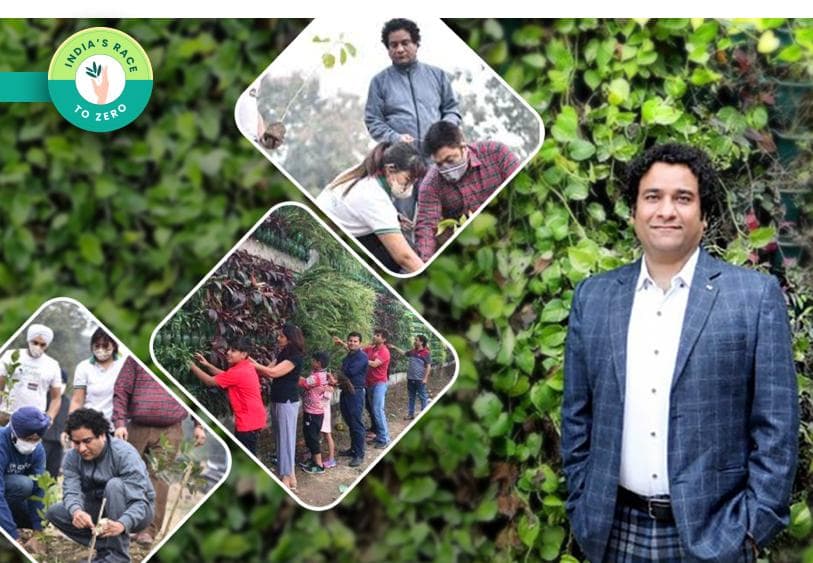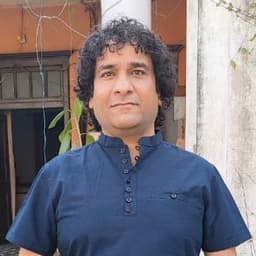Redefining The Green Revolution
‘Green Man of India’: Transforming urban landscapes by creating forests, vertical gardens & Nation’s first Plant & Tree hospital.
Rohit Mehra

As I gaze out over the verdant expanses of a newly created urban forest, the leaves rustle in the gentle breeze, each whisper a testament to the power of collective environmental action. The vibrant green of the trees and the playful chatter of birds create a symphony of nature that soothes the soul and reminds us of the beauty that can be found in our cities if we choose to embrace it. I am Rohit Mehra, widely known as the ‘Green Man of India’, and alongside my wife Geetanjali, I have dedicated my life to the conservation of nature through innovative green initiatives. Our journey is one of passion, dedication, and an unyielding commitment to the planet’s well-being.
It all began with a simple, yet profound realisation: plants are not merely decorative elements; they are essential life-support systems, integral to the health of our planet and our species. This understanding sparked a fire in us, a determination to use our skills and resources to make a meaningful difference. This led us to establish India’s first Plant and Tree Hospital—a sanctuary where ailing flora is nursed back to health, and where people learn about the vital role plants play in our ecosystem. The hospital is just one of our many initiatives to enhance green cover and promote sustainability across the country.
Our efforts extend beyond healing individual plants. We have embarked on an ambitious project to create mini-forests and vertical gardens across urban India. So far, we have planted over 375 forests and 500 vertical gardens nationwide, including the largest vertical garden in the country, which earned us a place in the Limca Book of Records. These green spaces are more than just aesthetic enhancements; they are essential lungs for our concrete jungles, purifying the air and providing vital habitat for local wildlife. These green spaces are not just about beautification—they are about survival, creating essential green lungs in concrete jungles where space is at a premium.
One might wonder, how can densely populated urban areas support such expansive greenery? The answer lies in our approach of biomimicry—emulating the natural processes of forest growth to develop lush, self-sustaining ecosystems. Our forests are designed to mimic nature’s randomness, fostering biodiversity that thrives without human interference. This approach not only enhances urban aesthetics but significantly improves air quality, reduces urban heat, and supports local wildlife. By replicating the patterns and processes of natural ecosystems, we create spaces that are not only visually stunning but also functionally resilient and regenerative.
Moreover, sustainability is woven into the very fabric of our projects. For instance, our vertical gardens utilise recycled plastic bottles, transforming waste into vibrant life-supporting structures. This method has not only beautified urban spaces but also provided a practical solution to the problem of plastic waste, a significant concern in our fight against environmental degradation. By repurposing discarded materials, we demonstrate that creativity and ingenuity can turn waste into a valuable resource, embodying the circular economy principles that are key to a sustainable future.
The concept of Vriksh Ayurveda, or the ancient science of plant life, underpins our work. This traditional knowledge, drawn from centuries-old texts, offers invaluable insights into natural plant care, emphasising the balance of elements and fostering an environment where plants can thrive. By applying these age-old principles, we address the ecological challenges of the modern world, demonstrating that ancient wisdom can have contemporary applications. Through Vriksh Ayurveda, we tap into a wealth of knowledge that has been passed down through generations, reminding us of our deep connection to the earth and our responsibility to care for it.
Education and community engagement are central to our mission. We believe that sustainability starts with awareness, and to that end, we have reached out to schools, institutions, and communities, teaching over 300,000 students the principles of Vriksh Ayurveda and environmental stewardship. Our educational programmes aim not only to inform but to inspire, cultivating a new generation of eco-conscious citizens who will carry forward the mantle of environmental care. By empowering individuals with knowledge and skills, we enable them to make informed decisions and take action that will benefit both themselves and the planet.
As I reflect on our journey, from rescuing individual plants to transforming urban landscapes, I am filled with hope. The challenges are immense, but the potential for positive change is even greater. Our vision is clear—to see a Plant and Tree Hospital in every district of India, each a beacon of sustainability and a testament to the resilience of nature. Imagine the impact such a network would have, not only on the health of our environment but also on the well-being of our communities and the future of our planet.
Together, we can redefine our relationship with the environment, turning urban centres into thriving green hubs that celebrate life in all its forms. It is not just our duty but our destiny to live in harmony with the natural world. As we forge ahead, let us remember that every small step counts, and each tree planted is a breath of life for our planet. By coming together, we can create a future where cities and nature coexist in harmony, where sustainability is the norm rather than the exception, and where every individual plays a part in protecting and preserving our precious planet.
